Artificial intelligence (AI) has revolutionized various aspects of modern life, and social media is no exception. AI refers to the development of computer systems that can perform tasks that typically require human intelligence, such as learning, reasoning, and problem-solving.
Social media platforms are online communities where people can interact, share, and consume content. The marriage of AI and social media has led to numerous innovations that have transformed the way people connect, businesses operate, and information is disseminated.
Importance of AI in the social media landscape
The importance of AI in the social media landscape cannot be overstated, as it has revolutionized the way users engage with content, interact with each other, and connect with businesses. By answering the question of how is AI used in social media, we can see that advanced algorithms and technologies have allowed for greater personalization, content moderation, and targeted advertising, resulting in enhanced user experiences.
Artificial intelligence tools play a crucial role in optimizing social media strategies, and the emergence of AI social media tools has created new opportunities for businesses to stay competitive in the digital sphere.
As the reliance on AI tools continues to grow, it is vital to recognize their transformative impact on the social media landscape and their potential to shape future developments in this ever-evolving domain.
Applications of AI in Social Media
Artificial intelligence has paved the way for a multitude of applications within the social media ecosystem, profoundly impacting both users and businesses. From content moderation to targeted advertising, AI-driven technologies have introduced new opportunities and efficiencies that continue to shape the digital landscape.
Let’s explore some of the key applications of AI in social media that have revolutionized the way we interact online.
Content moderation and filtering
Identifying and removing harmful content
AI-powered content moderation tools help social media platforms detect and remove harmful content, such as hate speech, misinformation, and explicit material. By using machine learning algorithms and natural language processing, these tools can identify and flag inappropriate content in real-time, ensuring a safer and more positive online environment for users.
Customizing user feeds for enhanced experience
AI algorithms play a crucial role in curating personalized user feeds by analyzing their preferences, online behavior, and social connections. By leveraging machine learning, social media platforms can display content that is most relevant and engaging to individual users, thereby enhancing their overall experience.
Chatbots and customer service
Automating customer interactions
AI-powered chatbots have transformed customer service on social media by automating routine interactions and providing instant support. Equipped with natural language processing, chatbots can understand user queries, offer assistance, and even resolve issues without human intervention, resulting in improved efficiency and customer satisfaction.
Providing personalized support
AI-driven chatbots can deliver personalized support by analyzing a user’s previous interactions, preferences, and concerns. By offering tailored solutions and recommendations, businesses can create a more positive and memorable customer experience on social media.
Targeted advertising
Analyzing user data for customized ads
AI plays a significant role in targeted advertising by analyzing user data to create customized advertisements that resonate with individual preferences and interests. By harnessing the power of machine learning, social media platforms can display highly relevant ads that are more likely to drive user engagement and conversions.
Optimizing ad performance
AI-driven analytics tools help businesses optimize their advertising campaigns by identifying patterns and trends in ad performance data. By adjusting targeting, content, and ad placements based on insights from AI, businesses can maximize their return on investment and achieve better results with their social media advertising efforts.
Sentiment analysis and social listening
Monitoring brand reputation
AI-powered sentiment analysis tools enable businesses to monitor their brand reputation on social media by analyzing user-generated content, such as posts, comments, and reviews. By gauging public sentiment and identifying potential issues, businesses can make informed decisions and take appropriate actions to protect and enhance their brand image.
Identifying trends and potential crises
Social listening tools that leverage AI can track conversations and trends across social media platforms, helping businesses identify emerging topics and potential crises. By staying informed about what their target audience is discussing and addressing concerns in a timely manner, businesses can maintain a positive presence on social media and even capitalize on new opportunities.
Best AI Social Media Tools
The growing influence of AI in social media has led to the development of numerous tools designed to streamline content creation, management, and analysis. These AI-powered solutions have become indispensable for businesses and individuals looking to optimize their social media strategies and stay ahead of the competition. Let’s explore some of the best AI social media tools available today.
Content creation and curation
Lumen5
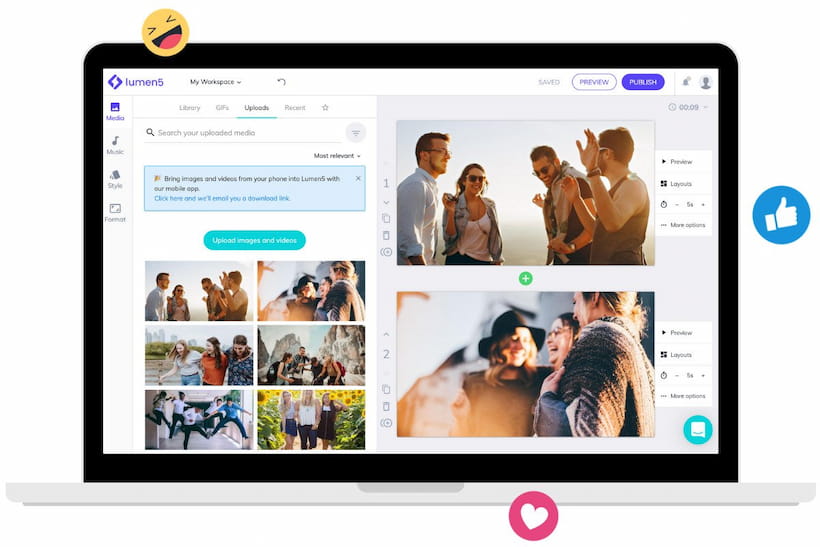
Lumen5 is an AI-driven platform that simplifies video content creation by automatically transforming text-based content into engaging videos. Using natural language processing and machine learning algorithms, Lumen5 identifies the key points from a given text and suggests relevant media assets, such as images, videos, and music, to create a visually appealing and shareable video.
RiteTag
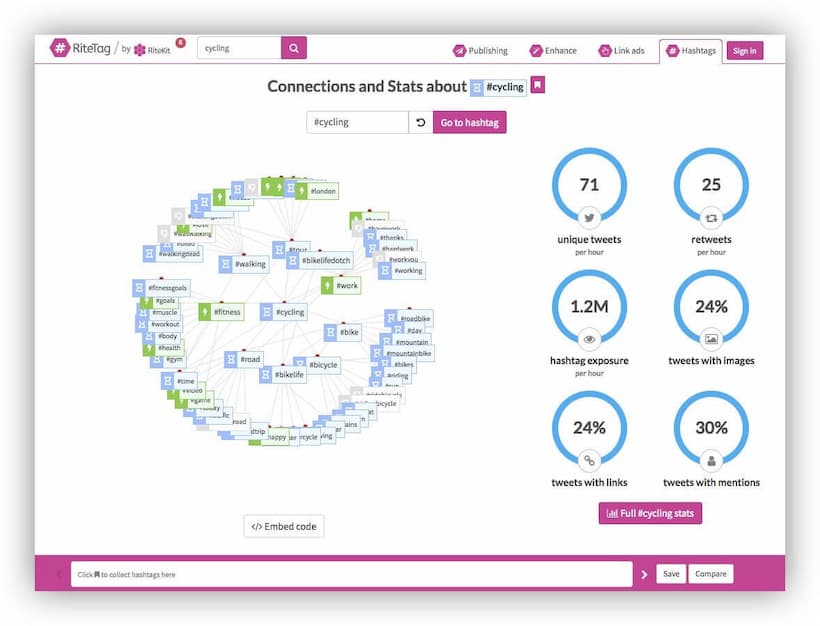
RiteTag is a social media optimization tool that utilizes AI to analyze and suggest the most effective hashtags for your content. By examining real-time data on hashtag performance, RiteTag helps increase content visibility and engagement across various social media platforms.
Social media management
Buffer
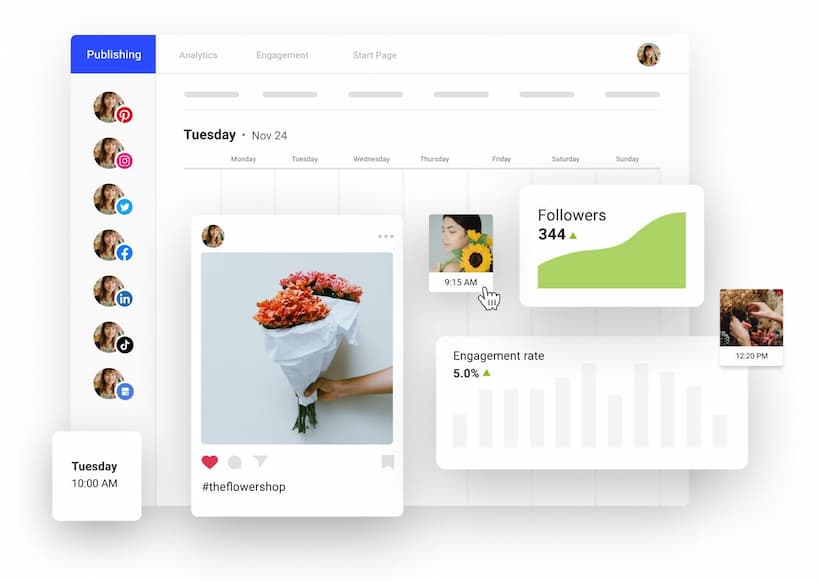
Buffer is a popular social media management platform that leverages AI to streamline content scheduling and posting. Its smart scheduling feature uses machine learning algorithms to determine the optimal times for posting content, ensuring maximum reach and engagement.
Hootsuite
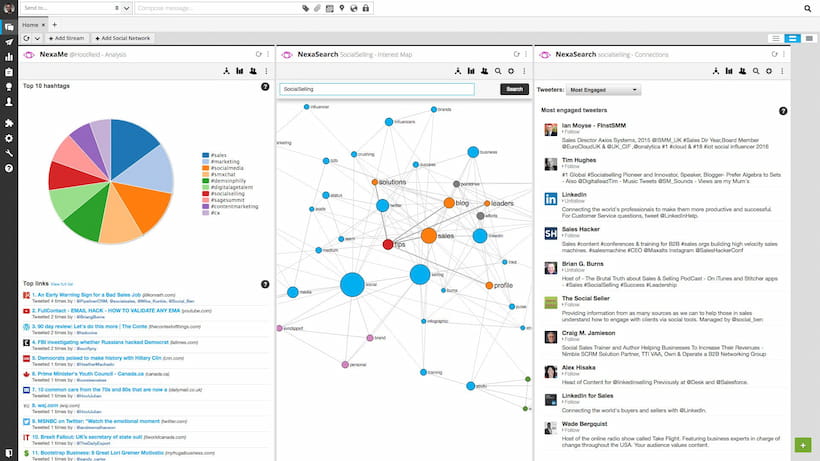
Hootsuite is a comprehensive social media management tool that incorporates AI to enhance content curation and performance analysis. With features like automatic content discovery and AI-driven content recommendations, Hootsuite enables users to stay on top of trending topics and share relevant content with their audience.
Analytics and insights
Sprout Social
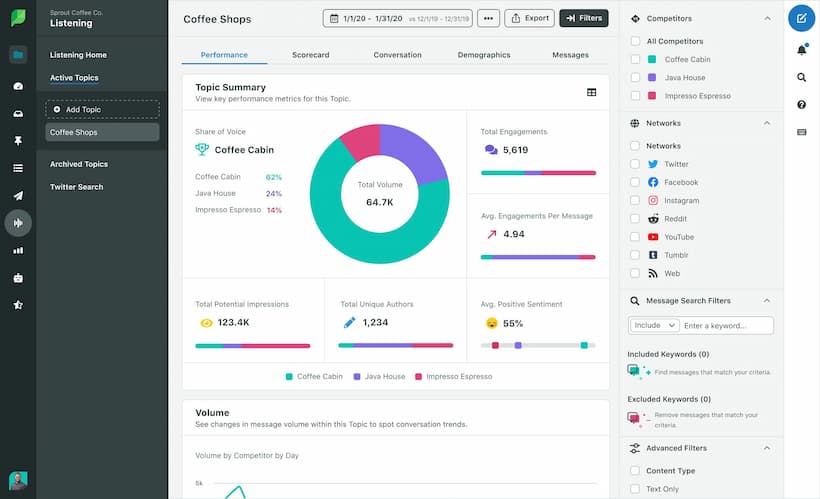
Sprout Social is an AI-powered social media analytics and management platform that provides actionable insights to improve your social media strategy. With features like sentiment analysis, competitor benchmarking, and trend identification, Sprout Social helps businesses make data-driven decisions and optimize their social media presence.
Talkwalker
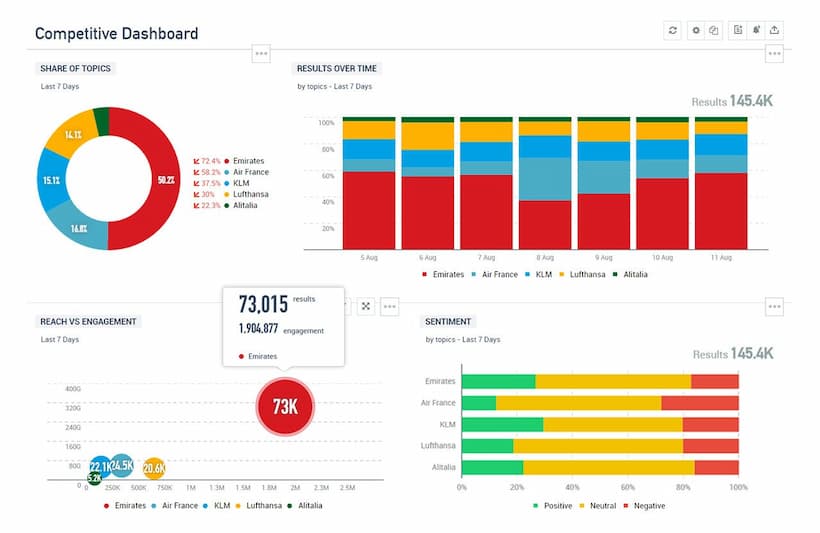
Talkwalker is an AI-driven social media analytics tool that offers robust social listening and sentiment analysis capabilities. By monitoring online conversations and analyzing user sentiment, Talkwalker enables businesses to understand their audience’s preferences, track their brand reputation, and identify potential opportunities or crises.
Influencer identification and outreach
Klear
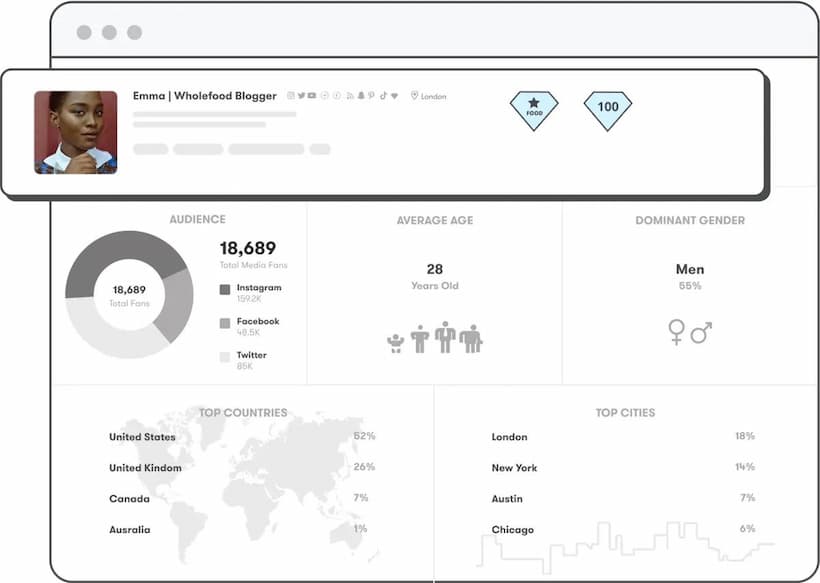
Klear is an influencer marketing platform that utilizes AI to identify and analyze relevant influencers across social media platforms. By examining factors such as engagement, audience demographics, and content quality, Klear helps businesses find the right influencers to collaborate with and expand their reach.
BuzzSumo
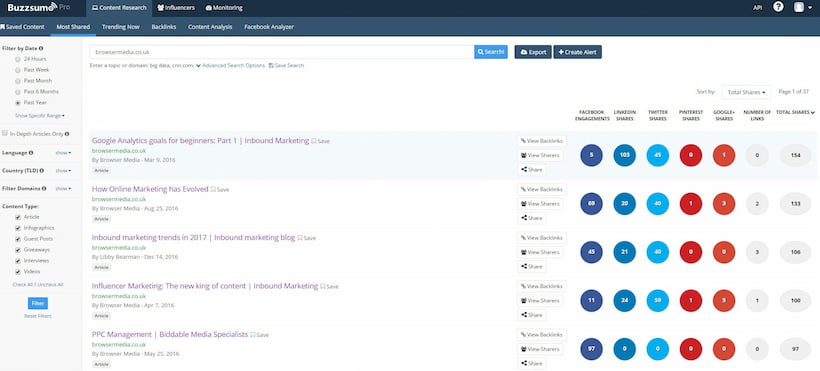
BuzzSumo is a content research and influencer identification tool that employs AI to discover the most shared and engaging content on social media. By analyzing content performance and identifying key influencers within specific niches, BuzzSumo enables businesses to create impactful content and connect with the right influencers to amplify their message.
Uses of Social Media AI Across Industries
The impact of AI on social media extends beyond content creation and optimization, with a growing number of industries harnessing its potential to enhance customer experiences and streamline operations. From retail to entertainment, AI-driven social media applications have led to significant advancements and opportunities. Let’s examine some notable examples of how social media AI is being utilized across various industries.
Retail and e-commerce
Personalized product recommendations
AI-driven social media platforms enable retailers and e-commerce businesses to offer personalized product recommendations based on user preferences, browsing history, and social interactions. By analyzing this data, businesses can provide tailored shopping experiences that increase customer satisfaction and drive sales.
Virtual fitting rooms
Computer vision and AI technologies have given rise to virtual fitting rooms on social media, allowing customers to visualize how clothing items would look on them without physically trying them on. This innovative approach has transformed the online shopping experience, leading to higher conversion rates and reduced return rates.
Healthcare
Online support groups
AI-powered social media platforms have facilitated the creation of online support groups for patients and caregivers, enabling them to connect with others facing similar health challenges. By analyzing user-generated content and providing personalized resources, these platforms foster a sense of community and empower individuals to better manage their health.
AI-driven health campaigns
Healthcare organizations can leverage AI-driven social media campaigns to raise awareness about specific health issues, promote preventive measures, and encourage healthy behaviors. By analyzing user data and crafting tailored messages, these campaigns can achieve greater engagement and effectively influence public health outcomes.
Finance
Fraud detection and prevention
Financial institutions can use AI-powered social media monitoring tools to detect and prevent fraud by identifying suspicious activities, such as phishing attempts and fake accounts. By analyzing user behavior and communication patterns, these tools can help protect customers and maintain the integrity of financial services.
Customer service automation
AI-driven chatbots and customer service tools are increasingly being used by financial institutions on social media to streamline customer interactions and provide personalized support. By automating routine inquiries and offering tailored financial advice, these tools help enhance customer experiences and improve operational efficiency.
Entertainment
Tailored content suggestions
Entertainment companies can harness the power of AI-driven social media platforms to analyze user preferences and deliver tailored content suggestions. By offering personalized recommendations, these platforms help users discover new movies, TV shows, music, and events, resulting in increased user engagement and loyalty.
Virtual reality experiences
AI and social media have paved the way for immersive virtual reality experiences, allowing users to explore digital environments and interact with others in real-time. By leveraging advanced computer vision and machine learning algorithms, these experiences have transformed the way users consume and engage with entertainment content, offering new opportunities for creators and businesses alike.
Conclusion
Recap of the impact of AI on social media
Artificial intelligence has profoundly influenced the social media landscape, bringing about significant changes in the way users interact, businesses operate, and content is consumed. From content personalization and moderation to targeted advertising and customer support, AI-driven tools and technologies have reshaped the digital experience for billions of users worldwide.
Some of the best social media tools, such as Buffer, Hootsuite, and Sprout Social, leverage AI to optimize content scheduling, management, and analytics, enabling businesses to stay competitive and maximize their potential on various platforms.
Future prospects and challenges in AI-driven social media
As AI continues to evolve, we can expect further innovations and applications in the realm of social media. These advancements may include even more personalized user experiences, enhanced content creation capabilities, and sophisticated analytics tools that provide deeper insights into user behavior.
However, the increasing reliance on AI also raises concerns about privacy, data security, and the potential for amplifying biases and misinformation. Balancing these challenges with the vast potential of AI-driven social media will be critical to ensuring a safe, inclusive, and engaging online environment that benefits both users and businesses in the years to come.
Frequently Asked Questions
1.Why is AI important in social media?
AI is important in social media because it enables platforms to deliver highly personalized and engaging experiences for users while offering businesses more efficient and effective ways to manage their online presence. AI algorithms analyze vast amounts of user data to provide tailored content, targeted advertising, and improved customer interactions.
2.How does TikTok use AI?
TikTok utilizes AI in several ways to create a highly personalized and engaging user experience, making it one of the most popular social media platforms today. The primary application of AI in TikTok is through its recommendation algorithm, known as the “For You” feed.
The algorithm analyzes user behavior, such as interactions with content, watch time, likes, shares, and even the type of device used, to deliver tailored content that aligns with individual preferences and interests.
Additionally, TikTok leverages AI in the form of computer vision and natural language processing to understand the content within videos, such as text, objects, and audio. This analysis helps in content moderation, ensuring that harmful or inappropriate content is flagged and removed.
AI is also employed in creating and enhancing creative features, such as filters, effects, and video editing tools, that enable users to produce engaging and shareable content with ease.
3.Is WhatsApp an artificial intelligence?
WhatsApp itself is not an artificial intelligence, but a messaging platform that facilitates communication between users through text, voice, and video. However, WhatsApp can incorporate AI-powered features, such as chatbots and natural language processing, to enhance user experiences and offer automated support for businesses.
For instance, businesses can use AI-driven chatbots on WhatsApp to automate customer interactions, provide instant responses to common inquiries, and offer personalized support. These chatbots can analyze user messages and generate contextually appropriate responses, making it easier for businesses to manage customer service on the platform.